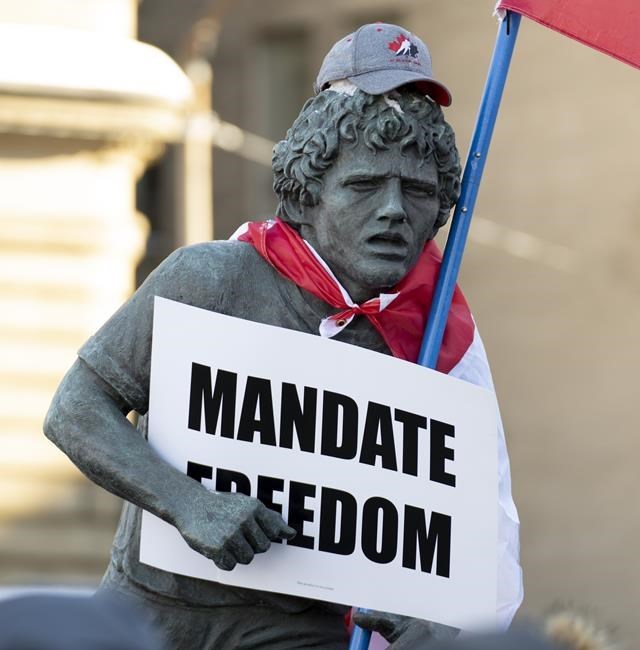PORT COQUITLAM, sa���ʴ�ý — A British Columbia mayor says the defacing of a statue of Terry Fox near Parliament Hill has ignited disbelief among residents in the national hero's hometown, and he's calling on them to channel their frustration into doing something positive.
Brad West said the citizens of Port Coquitlam revere Fox and don't support anyone using his image to make political statements that Fox would not have supported.
"For us in Poco, but I think for millions of Canadians across the country, Terry Fox is above politics," West said Monday.
He joined others, including Ottawa Mayor, Jim Watson, who denounced demonstrators for placing an upside down Canadian flag on Fox's statue, along with a sign opposing COVID-19 mandates, during protests that drew thousands to the capital as part of a convoy of long-haul truckers.
Police in Ottawa are investigating the defacing of the Fox statue, along with allegations that protesters also desecrated the Tomb of the Unknown Soldier at the National War Museum by dancing on it during the "Freedom Convoy."
West said he has encouraged people in his community in Metro Vancouver to honour Fox's legacy by making a donation to the Terry Fox Foundation to benefit cancer research.
He said the annual Terry Fox Run has brought people around the world together for decades to carry on Fox's dream to find a cure for cancer, but the desecration of his statue in the nation's capital says more about divisiveness.
Fox's name graces several places across the country, including schools and streets, a mountain peak in British Columbia as well as hiking trails, parks and monuments.
Last October, Port Coquitlam unveiled a new public plaza, calling it the Terry Fox Hometown Square, as part of a recreation centre that will house three hockey rinks, a pool, gym, library and a space for seniors.
The city is also commissioning a new sculpture of Fox for the site, and West said it is expected to be unveiled in about a year.
In April 1980, Fox embarked on a cross-sa���ʴ�ý run to raise money for a cure for cancer after his right leg was amputated above the knee due to bone cancer.
He started his Marathon of Hope in St. John's, N.L., but after 143 days and 5,373 kilometres on the road, he was forced to stop running outside of Thunder Bay, Ont., because cancer had appeared in his lungs.
He died in June 1981 at the age of 22.
The foundation has raised over $850 million for cancer research since then.
Fox's family did not wish to speak about the misuse of his statue, but the Terry Fox Foundation said in a Tweet on Saturday that Fox "believed in science and gave his life to help others."
Leslie Courchesne, CEO of the Tri-Cities Chamber of Commerce, which includes Port Coquitlam, said she was horrified to see images of how Fox's statue was treated in Ottawa on the weekend.
"My jaw dropped," she said. "I just had no words. It just cut right into my heart."
Courchesne remembered when she was first inspired by Fox's courage to run on one leg.
"I was 10 years old when his marathon was happening and it just made such an impression on me, how one person, in the face of such adversity, could just rise up and dedicate the remainder of his life to fighting cancer and inspire others to join the cause," she said.
— By Camille Bains in Vancouver
This report by The Canadian Press was first published Jan. 31, 2022.
The Canadian Press


